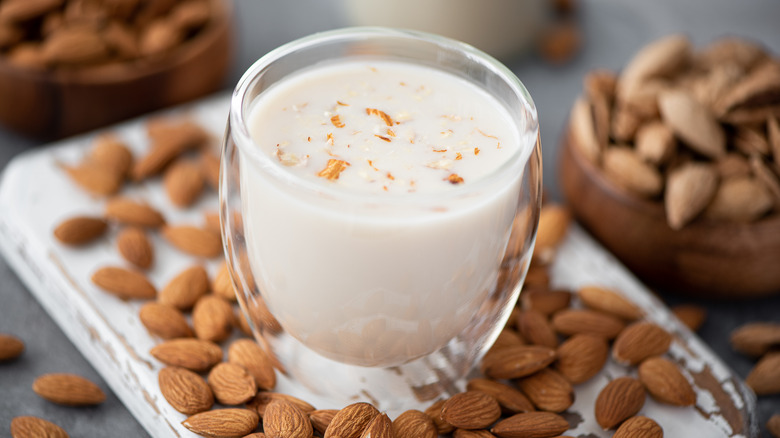Tell-Tale Signs That Your Almond Milk Has Gone Bad
According to LiveKindly, the consumption of dairy milk has decreased by a steep 40%. This decrease in dairy milk consumption has prompted an increase in plant-based alternatives. Of these plant-based alternatives, almond milk is the most popular, bringing in $344 million in sales within just three months in 2021, per Statista. Almond milk is beloved for different reasons. Some people love it because it's free of lactose, making it easier to digest for those who are lactose intolerant. Others enjoy the nuttiness it can infuse into food and beverages, such as smoothies.
Although almond milk is pretty different from dairy milk, they're similar in a key way; they both eventually expire. In general, almond milk stays fresh longer than cow's milk does but typically expires seven to 10 days after refrigeration. However, the FDA reports that the "Best if Used By" date on almond milk–or any other product, for that matter–is simply a recommendation regarding the food's quality, not an absolute date regarding the food's safety. So, if you store almond milk properly, you can technically drink it after the expiration date. Because of this, it can be a bit confusing to know when to toss it. Here are some tell-tale signs that almond milk has gone bad.
Texture, smell, and taste are tell-tale signs of bad almond milk
There are a few ways to tell if your almond milk has gone bad, each of them involving an examination of the milk's appearance, smell, or taste. According to Greatist, one key way to determine if almond milk has expired is the presence of lumps or curdling. Sometimes, it's normal for almond milk to look a bit weird, especially if it's homemade. However, shaking it up should be able to remedy this problem. If you still see lumps or a strange texture after shaking, your almond milk has likely expired. Additionally, if you notice that your almond milk has a sour smell or taste, it's definitely time to toss it.
Though almond milk eventually expires, you can follow some storage tips to lengthen its life. It's best to place almond milk at or near the back of your refrigerator, as this is where it's the coldest. You should also be aware of changing temperatures in the refrigerator door and refrain from storing your milk in this area.
Is homemade almond milk better than store-bought?
It's easy to go to the store and buy a carton of almond milk, but did you know that it's almost just as easy to make your own? You simply need almonds and water. But what are the advantages of homemade almond milk, and do these advantages make it better than the store-bought alternative? Well, since homemade almond milk only needs two ingredients, its biggest advantage is that it doesn't require a lot of time or effort to make. However, due to the price of almonds, HuffPost reports that making your own almond milk is a bit more expensive than simply buying it from the store.
According to Organic Authority, homemade almond milk is generally healthier than its store-bought counterpart. This is due to the lack of additives it contains. Many types of store-bought plant-based milks contain a product called carrageenan, which is derived from seaweed. Some scientists report that carrageenan causes stomach issues like inflammation and bloating, but this is up for debate (via Medical News Today). Nevertheless, these claims are enough for some people to refrain from buying store-bought almond milk. So, there's no definitive answer on whether homemade or store-bought almond milk is better. If you prioritize healthy eating, it might be best to go with homemade. Conversely, if you prioritize affordability, go with store-bought. Regardless of what type you choose, remember that appearance, smell, and taste are tell-tale signs of expiration.


